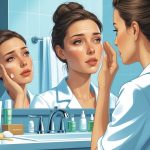Dermatologist-Backed Beauty Habits Quietly Saving Adults Hours Each Week
Sun Protection Every Adult Should Prioritize
SPF 30, broad-spectrum, mineral or chemical—my shelf’s a disaster and I still forget which one goes under moisturizer. Only thing that cuts through the noise? A dermatologist flat-out saying, “You need sun protection, period, if you care about wrinkles or skin cancer.”
Choosing the Right Sunscreen and SPF for Your Skin
People obsess over “clean beauty” and then skip sunscreen. I’ve watched friends spend $100 on serums and then fry at brunch. “Broad-spectrum” confused me for years—turns out it’s both UVA and UVB, not just sunburn but aging too. Learned that in a recent derm interview. “SPF 30 or higher, always,” she said.
I know folks who swear SPF 15 is “fine”—except, no, it’s not. Studies keep saying, under real sun, it’s basically the difference between “cooked-tomato” and “slightly less cooked tomato.” Also, mineral (zinc oxide, titanium dioxide) isn’t just for sensitive skin—chemical sunscreens sting my eyes every time. “Reef-safe” doesn’t matter if you’re allergic, so that label’s useless for some people.
How much sunscreen? A shot glass (about 1 ounce) for your whole body. Not a joke, Skin Cancer Foundation says so. Not that it matters if you sweat it all off and forget to reapply, but, hey, that’s life.
Daily Sunscreen: Broad-Spectrum Benefits
Avoiding UV by hiding in the shade? Doesn’t work if you forget your left arm cooks in the car. My dermatologist spotted a sketchy mole and said, “That’s your driving side.” Now I slather extra there and still forget my ears. Hats help, but don’t trust them.
I’ve read the studies: AAD says only broad-spectrum SPF 30+ really cuts your risk of skin cancer and sun damage. I want that, but I never remember to reapply every two hours. That’s what derms recommend, even if nobody actually does it.
And, yeah, I’d love to believe my skin “repairs itself” like the ads claim, but years of sun show up whether you burn or not. Mineral sunscreen leaves a weird white cast, but I’ll take that over spending hundreds on spot removers later. Sunscreen’s boring, but skipping it is just asking for trouble.
Targeted Anti-Aging Habits: Preventing Wrinkles and Fine Lines
Fine lines, crow’s feet, whatever you wanna call them—those things show up out of nowhere, and honestly, I still don’t know if missing one night of moisturizer is what does it. Probably not, but I’ll keep blaming that. Here’s the thing: retinoids and vitamin C, those are the only ingredients that have ever actually done anything for me. I used to hoard serums like some kind of skincare dragon, but I swear, 90% of it’s just noise.
How Retinoids and Retinoid Alternatives Save Time
Everybody online acts like nightly skincare is a sacred ritual, but I had a dermatologist just straight-up say, “Just use a retinoid.” No ceremony, no 12-step routine, just retinoid or nothing. Apparently, tretinoin and even the drugstore retinols force your skin to turn over faster and build up collagen, which, okay, sounds science-y. I guess there are studies? I never read them, but I trust the derm’s tired face more than some influencer.
Here’s the catch nobody warns you about: your skin will flake, peel, maybe even look worse before it gets better. I almost gave up, like, three times. But then I tried Arazlo (some new retinoid that’s supposedly gentler), and it didn’t destroy my face. Suddenly, I wasn’t spending half my night layering on calming creams. I pretty much stopped double cleansing, too—who has the energy for that? If you want the actual facts, retinoid creams are what derms use themselves. Not those endless exfoliators. Not that I listen, but still.
Vitamin C, Antioxidants, and Collagen Production
Vitamin C serums—either people swear by them or they’ve got three half-used bottles in the back of the fridge turning brown. I get it. My dermatologist made a face when I said I gave up on vitamin C, but apparently, if you stick with stabilized L-ascorbic acid, it actually does something. Supposedly it fights sun damage and helps with collagen, but only if you use it every day, not just when you remember after a bad sunburn.
Moisturizer tricks? Waste of time. If you’re not using vitamin C with sunscreen, don’t bother. I read somewhere (maybe the Journal of Clinical and Aesthetic Dermatology?) that daily vitamin C made a real difference in fine lines after three months. Three months! I could’ve saved so much money on those dumb sheet masks. If you want to go down the rabbit hole, there are dermatologist routines that break it all down, but honestly, one good antioxidant serum is probably enough. I wish I’d known that before I turned my bathroom into a lab.
Effortless Solutions for Skin Concerns in Adults
Dermatologists love to complain about complicated routines, but then they rattle off ingredient lists that sound like chemistry homework. I’m skeptical. Still, when I finally cut my routine down to the basics, my skin didn’t freak out as much. Go figure.
Handling Acne, Rosacea, Eczema, and Psoriasis Efficiently
My friend once texted me in a panic because her “acne routine” made her skin angrier. I’ve been there. I’ve tried every harsh cleanser, and all I got was extra oil and regret. Dermatologists in those NBC articles always say to use a gentle cleanser, which feels like a trick, but it’s not.
Azelaic acid—how did nobody tell me about this stuff sooner? It helps with redness, acne, even rosacea, and somehow doesn’t make my skin peel off. I love fragrance, but every time I use a scented moisturizer, my eczema throws a tantrum. CeraVe and Eucerin (with those weird pumps) are boring but reliable.
Psoriasis? I just moisturize like my life depends on it, slap on a steroid cream if my doctor says so, and try to remember to use lukewarm water (not that I ever do). I read that tip in a minimalist skincare guide. My shower’s always too hot.
Treating Hyperpigmentation, Dark Spots, and Uneven Skin Tone
I swear my dark spots move around at night. Turns out, niacinamide is the answer for pretty much everyone, no matter your skin tone. I don’t get why it’s suddenly in everything, but it works and doesn’t burn. That’s enough for me.
I’m terrible at sunscreen. Derms say SPF 30, minimum, and they never stop repeating it. If you skip it, your spots come right back—ask me how I know. Azelaic acid helps fade spots too, which is wild because it also helps with acne. Brightening serums? Maybe they’re just marketing, but some dermatologists say to use vitamin C and SPF together.
Instagram says to exfoliate more, but my skin says nope. Honestly, patience is the only real advice—skin changes take forever. Months, not weeks. I hate it.



